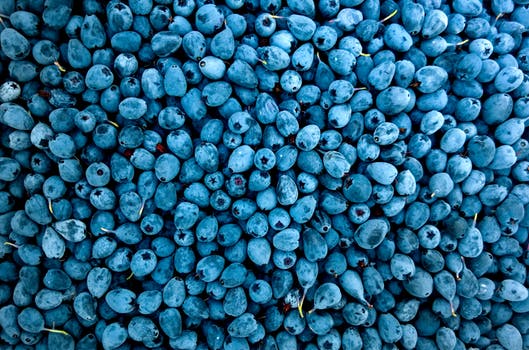OMG! I Love Blueberries!! And, it’s Blueberry Season up here in Southern Ontario…
According to the Wild Blueberry Association, there are twice the nutrients in wild blueberries compared to the cultivated (farmed) ones. In fact, studies state that wild blueberries have some of the highest antioxidant values of commonly consumed fresh fruits.
Now if you have a chance to pick some – go for it! – otherwise you might want to break the bank and treat yourself to a small container 125 grams for about $6!!
This is why…
Some of the Many Health Benefits of Wild Blueberries
- Blueberries help to reverse oxidative stress, that’s the kind of damage the cell endures when we are stressed. They are full of anthocyanin, the phytochemical responsible for their dark colour and a good portion of their antioxidant power.
- Blueberries help to protect our brains and can actually help to improve cognition and memory
- Studies show that blueberries can attack free radicals (cancer cells) while not damaging healthy cells. In addition to anthocyanins, blueberries also contain ellagic acid – which has been shown to fight cancer – and resveratrol, the same antioxidant in red wine.
- Blueberries support bone health as they contain iron, phosphorous, calcium, magnesium, manganese, zinc, and vitamin K. Each of these is a component of bone. Adequate intake of these minerals and vitamins contributes to building and maintaining bone structure and strength.
- They are also a great source of vitamin C and fibre
Varieties of Blueberries (survey the grocery store)
Most of the blueberries we buy are grown on farms and can grow to be the size of a small marble. Domestically grown cultivated blueberries are on the market from May through September or October. Other times of the year, imported blueberries may be available.
Wild blueberries are much smaller than blueberries that grow on a fruit farm. As compared to farmed blueberries, wild blueberries have a chewier texture and are more varied in color, ranging from a reddish blue to a purplish blue.
All blueberries contain a significant amount of antioxidants, however, the ones with the darker pigments are higher in anthocyanins.
Wild blueberries can be found fresh in Maine or the more northern and eastern provinces of Canada. Outside of the local growing area blueberries are often available canned, frozen or dried.
Dried blueberries can be found in specialty food markets and many supermarket bulk sections. They provide a concentration of the whole fruit’s nutrients such as anthocyanins.
Keep in mind that the calories in dried blueberries will also be concentrated. Dried, canned or frozen blueberries may also be sweetened – which means extra calories – so check the label for “no added sugar” or “unsweetened”.
Basic Tips
How to Choose Blueberries
Look for firm, deep blue or purplish berries that are not soft or bruised. Wash them right before eating.
The waxy, whitish-gray coloring on the blueberry is referred to as the “bloom” and is a sign of freshness and is a natural protection that helps keep the berry from spoiling.
For frozen blueberries are great when fresh berries are not in season. Be sure that the blueberries rattle around in the bag or container. If they are frozen into a solid clump, it’s an indication that the berries have thawed and then been refrozen.
Be sure to buy only unsweetened blueberries, as opposed to the frozen or canned sweetened product, to reduce the number of calories you consume – and to ensure that you’re enjoying the natural flavor of this delicious fruit!
How to Wash Blueberries
Shortly before you eat them, rinse your fresh blueberries with cool running water and pat dry. Remove any leaves or stems. Then – voila! – they are ready to eat.
Frozen blueberries should be quickly rinsed under cold running water. Then, let them thaw at room temperature for a few minutes before adding to uncooked dishes.
When using frozen berries in cooked dishes, do not thaw and lengthen the cooking time a few minutes.
How to Store Blueberries
Do not wash fresh blueberries before storing.
Blueberries are the hardiest of all the berries and will last for seven to 10 days if refrigerated.
Before refrigerating, empty the container of blueberries into a bowl and remove any that are crushed or moldy, then return blueberries to their container. This will prevent the good blueberries from going bad too quickly.
If you have extra fresh blueberries (which we RARELY do) – add them to this amazing muffin recipe.
Or, this is a great way to use frozen blueberries year round.
REFERENCES:
J Agric Food Chem. 2004 Jun 16;52(12):4026-37
https://academic.oup.com/carcin/article/28/8/1800/2526773
https://www.ncbi.nlm.nih.gov/pubmed/20054730
https://www.ncbi.nlm.nih.gov/pubmed/16399225
https://www.medicalnewstoday.com/articles/287710.php
https://www.ncbi.nlm.nih.gov/pubmed/23789932

